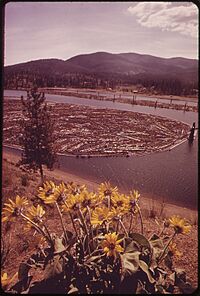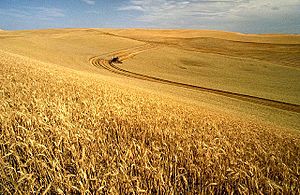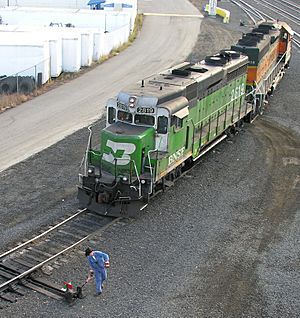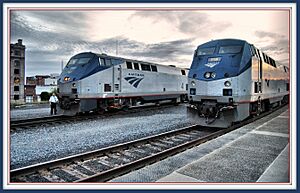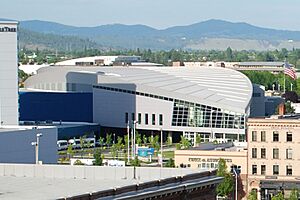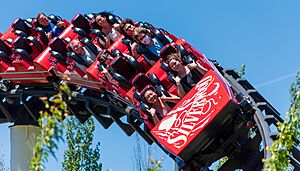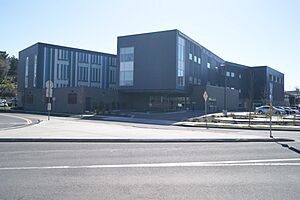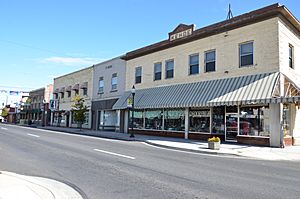Economy of Spokane, Washington facts for kids
The economy of the Spokane area is super important! It's like the main engine for business, factories, transportation, and even healthcare, shopping, and fun in the huge Inland Northwest region. Think of Spokane as the busy center for an area about 80,000 square miles big!
The Spokane area and the Coeur d'Alene area in Idaho are close neighbors. Even though they haven't officially joined as one big economic area, they work together a lot. In early 2020, about 287,000 people worked in the Spokane area. The biggest job areas were education, health services, trade, transportation, and government.
Spokane's economy used to rely mostly on natural resources. This means things like farming, cutting down trees (logging), and digging up minerals (mining). But now, the city's economy has grown to include other cool industries. These include technology, healthcare, and even biotech (which uses living things to make products).
The city's trade started way back in 1810 with the fur trade. A place called Spokane House was the center for trading furs between the Rocky Mountains and the Cascade Mountains for 16 years! Later, gold and silver were found nearby. This led to a big mining boom. After the mining slowed down, farming and logging became the main economic drivers. For a while, Spokane's growth slowed down, but it bounced back by adding new types of businesses.
Contents
Spokane's Economic Journey
Early Trade
Long ago, an explorer named David Thompson sent trappers to build a fur trading post on the Spokane River. This was in 1810. It was a busy place for trading furs with local Native American tribes. This post was the main spot for fur trading in the region for 16 years.
Mining Excitement
In 1883, people found gold, silver, and lead in northern Idaho. This caused a big rush of people hoping to get rich! Spokane became a popular place for these prospectors. They could buy everything they needed, from horses to frying pans, at good prices. Spokane stayed important because it was easy to reach by railroad.
Spokane became a key center for trains and shipping. This was because it was located between the mining areas and the rich farming lands. When several big railroads came to Spokane, it became one of the most important train hubs in the western United States. Goods could be shipped out in all directions quickly.
Trees and Farms
After mining slowed down around 1900, farming and logging became super important for Spokane. The first business in Spokane, built in 1871, was a sawmill! People found out there were huge amounts of valuable white pine trees in the nearby mountains. So, lumber companies from the eastern U.S. came to invest.
Just like with mining, loggers and mill workers got their supplies from Spokane. By the early 1900s, Spokane was known for making doors, window frames, and other wood products. It also became a center for processing and distributing dairy and fruit products.
The farmlands around Spokane were like a "breadbasket," producing lots of food. With new railroads and highways, farmers could easily get their products to market. Spokane was a vital place for agricultural trade and supplies.
Times of Change
Spokane's growth slowed down in the 1910s. This was partly because big national companies started to control the mines and resources. This meant less money stayed in Spokane.
The region relied a lot on natural resources. When demand for these goods fell, it hurt the economy. During the Great Depression in the 1930s, many woodworkers lost their jobs.
But then, big projects like the Grand Coulee Dam helped the region. These dams provided cheap electricity. This allowed new industries to grow, like making aluminum for World War II airplanes and boats. This brought many jobs to Spokane. The government also built a military supply center in Spokane Valley. They thought it was far enough inland to be safe from attacks.
New Industries Emerge
In the 1980s, Spokane faced another tough time when prices for silver, timber, and farm products dropped. Many factory jobs were lost. But Spokane's economy slowly started to change. Companies like Key Tronic (which makes computer parts) and other tech companies helped Spokane rely less on natural resources.
Today, mining, forestry, and farming are still important. But Spokane's economy has added high-tech and biotech industries. The city is also growing its medical and health sciences fields. The University of Washington and Washington State University have opened medical school branches here. A big shopping mall, River Park Square Mall, opened in 1999. This helped bring new life to downtown Spokane.
Major Companies in Spokane
Spokane is home to the main offices of several important companies.
- PotlatchDeltic is a big company that owns and manages timberlands (forests for wood) in several states.
- Clearwater Paper makes paper products. It was once part of Potlatch.
- Key Tronic makes computer equipment.
- Avista Utilities provides electricity and natural gas to homes and businesses.
- Cowles Publishing Company publishes newspapers.
- Rosauers Supermarkets and Yoke's Fresh Market are local grocery store chains.
- URM Stores distributes food to supermarkets.
Other companies with headquarters nearby include:
- Itron and Telect (technology companies) in Liberty Lake.
- Cyan Worlds (a computer game developer) in Mead.
- Buck Knives (knife maker) in Post Falls, Idaho.
- Hecla Mining (a mining company) in Coeur d'Alene, Idaho.
Important Industries Today
The biggest industries in Spokane are education, healthcare, and social assistance. These jobs make up a large part of the workforce.
The top five employers in Spokane are:
- The State of Washington
- Spokane Public Schools
- Providence Sacred Heart Medical Center and Children's Hospital
- The 92nd Air Refueling Wing (a military unit)
- Spokane County
Other important industries include business services, manufacturing (making things), and construction. Fairchild Air Force Base is also a big military facility here.
Farming
Spokane County has over 2,500 farms! Processing food in Spokane brings in a lot of money. Farming activities support many jobs and create a big economic impact.
The areas around Spokane, especially to the south, are very good for farming. This region is called the Palouse. It's one of the largest wheat producing regions in the United States. The cool, snowy winters and rainy springs help many different crops grow. A lot of the wheat grown here is shipped to countries in Asia.
Spokane also has a growing scene for making wine and craft beer. Washington state is second in the country for wine production. The Yakima Valley nearby grows most of the hops used in the United States. This helps the craft brewery scene grow!
Mining and Forest Products
The mining areas in northern Idaho are still very productive. The Silver Valley in Idaho has produced more silver than almost any other place in the United States! It's one of the top three silver districts in the world.
Companies like Gold Reserve Inc. and Hecla Mining are involved in mining here. There's even a big annual mining convention in Spokane Valley.
Forestry (managing forests) and wood products are still important too. PotlatchDeltic manages huge areas of timberlands and makes wood products. They use sustainable practices, which means they manage the forests so they will be healthy for a long time. Clearwater Paper makes tissue and paperboard products.
Manufacturing
About 18,000 people work in manufacturing in Spokane. This includes making wood and food products, printing, metal products, electrical equipment, and transportation equipment. Spokane is a good place for manufacturing because it has cheap electricity from dams and good transportation with railroads and highways.
Buck Knives, a well-known knife maker, moved its factory to Post Falls, Idaho, partly because of lower energy costs. Key Tronic in Spokane Valley is one of the largest companies that makes electronic parts for other businesses. Spokane is also a big center for aerospace manufacturing, making parts for airplanes.
Transportation and Shipping
Spokane has always been important for moving goods and people. The Spokane Transit Authority (STA) provides bus service around the area. There are plans to extend bus service to Coeur d'Alene, Idaho, in the future.
You can also travel by train with Amtrak or by bus with Greyhound from the Spokane Intermodal Center. Spokane is a major railway hub for several big train companies.
The Spokane International Airport is the second largest airport in Washington state. It handles millions of passengers and tons of cargo each year. This helps businesses ship goods efficiently. Many companies use Spokane as a regional distribution center. For example, Amazon.com has a big fulfillment center here. URM Stores and Jensen Distribution Services also ship many items from Spokane to other states.
Tourism and Fun
Spokane is a hub for shopping and entertainment for the whole Inland Northwest region. People from smaller towns come to Spokane to shop at big stores and malls like River Park Square Mall and NorthTown Mall.
The Spokane Convention Center is a big draw for visitors. It hosts many conventions and events. This brings in people who stay in hotels, eat at restaurants, and shop. Sporting events are also a big deal! Spokane has hosted major events like the U.S. Figure Skating Championships. A new sportsplex called The Podium, opened in 2021, hopes to attract even bigger sports events.
Tourism is growing because Spokane is on the way to many regional attractions. Local events like the Bloomsday race and Hoopfest bring in thousands of people. Spokane can be a "base camp" for outdoor activities like river rafting and camping.
Nearby, in Airway Heights, there are two casino hotels, Northern Quest Resort & Casino and the Spokane Tribe Casino. Other entertainment venues like the Spokane Arena and Knitting Factory host concerts and shows.
In northern Idaho, tourism is a huge part of the economy. Coeur d'Alene is a popular tourist spot with its beautiful lake, water sports, and resorts. There's also the Silverwood Theme Park, the largest theme park in the Pacific Northwest. Plus, there are several ski resorts nearby for winter fun!
Energy and Technology
The technology sector in Spokane is growing steadily. Companies that provide utilities and related technologies are important. Avista is the main power company for Spokane and much of eastern Washington. It's one of the biggest private employers in the city.
Avista has also helped start other notable businesses. For example, Itron is a technology company that helps measure and manage energy and water use. They make "smart meters" and software for utility companies around the world. These companies are part of the growing clean energy industry.
Healthcare
Healthcare is a very important and growing industry in Spokane. The city offers special medical care to patients from all over the Inland Northwest. Spokane has six major hospitals. The two biggest are Sacred Heart Medical Center and Deaconess Hospital.
Sacred Heart Medical Center has a special heart institute. It also has one of only ten "special pathogen units" in the U.S. that can treat highly infectious diseases. It's the only Level II trauma center in the Inland Northwest, meaning it can handle serious injuries.
Healthcare and social assistance is the fastest-growing industry in Spokane County. It employs over 46,000 people. The University of Washington and Washington State University have medical schools in Spokane. These schools help train new doctors and encourage research in biotechnology. The local chamber of commerce sees healthcare as the biggest opportunity for future growth in Spokane.
Growing Spokane's Economy
Even with new industries, Spokane's economy has faced challenges. There haven't always been enough high-paying jobs. But local and state governments are working hard to improve things.
They are focusing on growing industries like:
- Manufacturing (especially aerospace)
- Health sciences
- Professional services
- Technology
- Finance and insurance
- Clean energy
- Digital media
Organizations like Greater Spokane Incorporated work with businesses to help them grow and attract new companies. They also work to improve public areas like streets and sidewalks to make the city more attractive for businesses.
Some companies have moved to Spokane because it's easy to get raw materials and operating costs are lower, like cheap hydroelectric power. The city is also trying to attract tech companies by offering high-speed internet connections downtown. This area is sometimes called the "Terabyte Triangle."
 | Sharif Bey |
 | Hale Woodruff |
 | Richmond Barthé |
 | Purvis Young |



